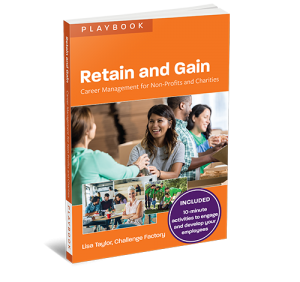Career professionals and educators know that career conversations are powerful. We know that helping staff connect their day-to-day work with longer-term career aspirations enhances employee engagement and loyalty. We also know that often employees don’t know how to articulate their own career goals.
While the importance and benefits of career conversations are evident to career counsellors, they are not always clear to managers inside organizations. In researching and writing two books in the Retain and Gain series, I’ve learned that leaders and managers inside of small businesses and non-profits believe that career conversations are risky. Rather than seeing them for the mission-enhancing tools they can be, leaders across sectors believe that engaging in open career-focused conversations can put the organization at risk. I’ve identified three specific risks that need to be addressed if, as a sector, we are to permeate into organizations and empower managers to be better career advisors for their teams.
Risk #1: Pandora’s box

This fear is not just limited to front-line managers. Recently, following the release of Retain and Gain: Career Management for Non-Profits and Charities, an executive director indicated that she was tempted to purchase copies for her directors and host a lunch and learn on the topic. “But Lisa,” she said, “what happens if our directors instruct managers to actually use the Playbook? Do I really want to get into career conversations with staff given our current budgetary constraints?”
Career professionals need to help organizations understand that career development augments and supports growth and advancement. We provide tools and approaches that go well beyond compensation to ensure organizations remain strong.
Risk #2: Imposter syndrome
This risk is based on an assumption that managers are not natural career advisors for staff and that they will not feel comfortable having career-related conversations. At the heart of this risk is the fear that managers will find themselves in situations where they lack the skills or don’t have the knowledge needed to address employee concerns. They will appear as if they have command of careers but lack the substance to back it up.
Canadians receive more career guidance from their workplace manager than they do from any other professional connection. Parents and peers also play a part in how informal guidance is provided, but it is the front-line manager who communicates intended and unintended messages about how roles, opportunities and organizations are changing and how this will affect employees.
The reality is that most managers receive no formal career development education or training. They are given guidelines on how to deliver various types of messages to their staff, but very little opportunity to learn just how rich tools from our sector can be to help them engage, retain and develop their teams. As career professionals, we know how useful the tools are – and that they work. We have an important role to play in helping organizations build this capacity internally. Additionally, we need to share more stories of career development within workplaces. This will help managers see the role they can play and develop confidence in the potential for success as a career advisor for their team.
Risk #3: Time warp
Leaders and managers already feel that there is too much to do and not enough time to accomplish all that is on their plate. The addition of career conversations that can become quite personal can feel like an activity that would put their entire workflow and schedule at risk.
Career conversations in isolation or as an exception are time-consuming. Employees hungry to understand how their work can evolve and support their future ambitions will want to have detailed and perhaps even challenging conversations. However, the solution is not to avoid having conversations, but to normalize how they are held and who participates.
Simple, everyday activities, such as those provided within the Retain and Gain series, can encourage employees to reflect on their own careers and be intentional with the time they have with their managers. The Playbook provides guidance on how to build career champions across the organization and ensure career development happens all the time. Embedding career development into organizational culture can become a potential source of managerial efficiency. As employees are encouraged to grow, their circle of advisors and supporters will also grow.
Being bold
As career professionals, we need to boldly assert ourselves with organizational leadership teams. We need to encourage them to be bold in initiating career-related conversations and programs inside of their organizations and we need to help make the link between bold organizational results and career-focused staff, even in sectors with limited resources, flat organizations and overworked managers. Small businesses and non-profits need career development support to overcome their fears and realize the full potential of their workforces.
This article was originally published on ContactPoint on Nov. 5, 2018.





